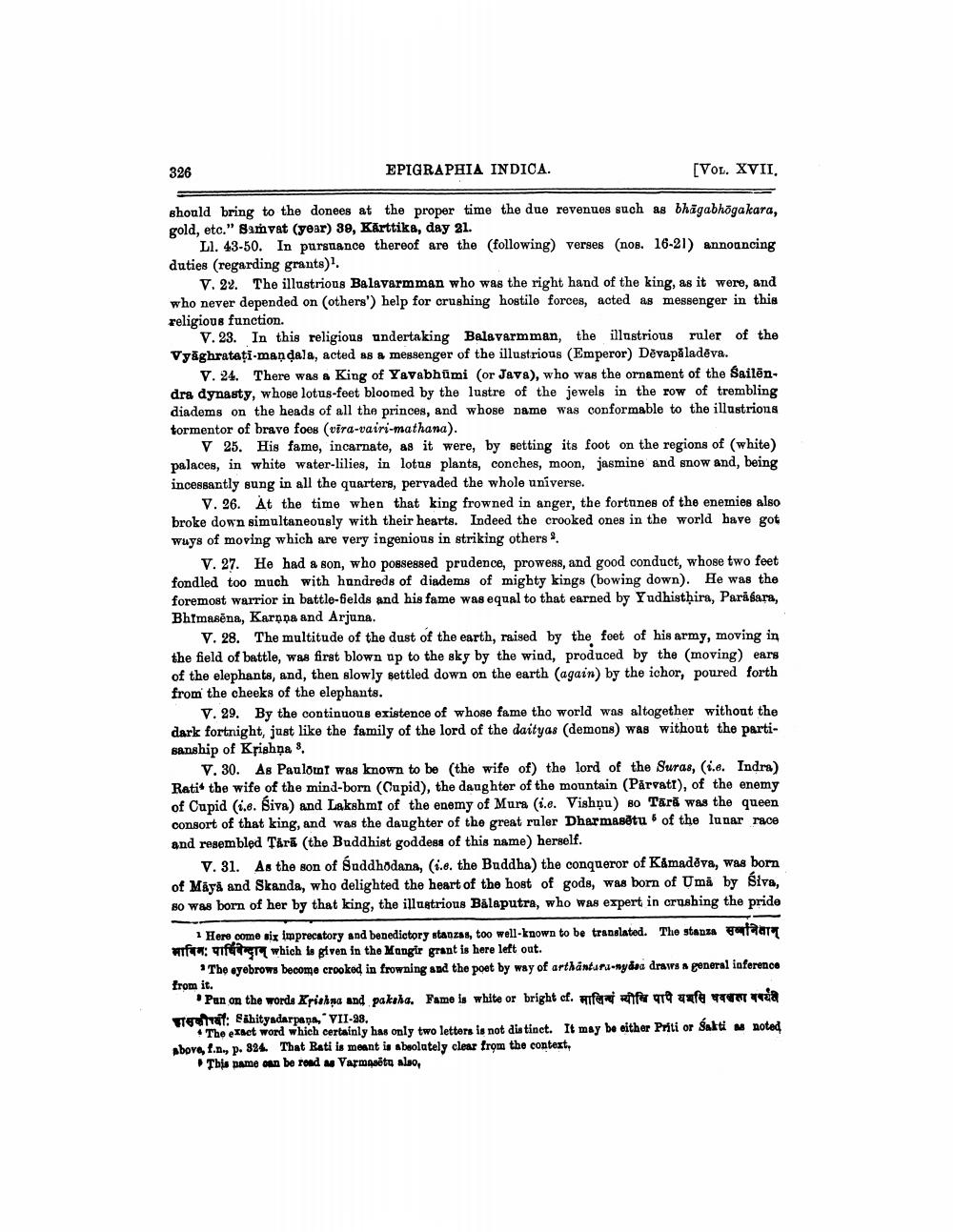________________
326
EPIGRAPHIA INDICA.
[VOL. XVII,
should bring to the donees at the proper time the due revenues such as bhāgabhögakara, gold, etc." Samvat (year) 39, Kärttika, day 21.
Ll. 43-50. In pursuance thereof are the (following) verses (nos. 16-21) announcing duties (regarding grants)?
V. 22. The illustrious Balavarmman who was the right hand of the king, as it were, and who never depended on others') help for crushing hostile forces, acted as messenger in this religious function.
V. 23. In this religious undertaking Balavarmman, the illustrious ruler of the Vyāghratați-mandala, acted as a messenger of the illustrious (Emperor) Děvapā ladēva.
V. 24. There was a King of Yavabhūmi (or Java), who was the ornament of the Sailēn. dra dynasty, whose lotus-feet bloomed by the lustre of the jewels in the row of trembling diadems on the heads of all the princes, and whose name was conformable to the illustrions tormentor of brave foes (vira-vairi-mathana).
V 25. His fame, incarnate, as it were, by setting its foot on the regions of (white) palaces, in white water-lilies, in lotus plante, conches, moon, jasmine and snow and, being incessantly sung in all the quarters, pervaded the whole universe.
V. 26. At the time when that king frowned in anger, the fortunes of the enemies also broke down simultaneously with their hearts. Indeed the crooked ones in the world have got wuys of moving which are very ingenious in striking others
V. 27. He had a son, who possessed prudence, prowess, and good conduct, whose two feet fondled too much with hundreds of diadems of mighty kings (bowing down). He was the foremost warrior in battle-felds and his fame was equal to that earned by Yudhisthira, Parăsara, Bhrmasēna, Karnna and Arjuna.
V. 28. The multitude of the dust of the earth, raised by the foet of his army, moving in the field of battle, was first blown up to the sky by the wind, produced by the (moving) ears of the elephants, and, then slowly settled down on the earth (again) by the ichor, poured forth from the cheeks of the elephants.
V. 29. By the continuous existence of whose fame tho world was altogether without the dark fortnight, just like the family of the lord of the daityas (demons) was without the partisanship of Krishna
V. 30. As Paulount was known to be the wife of) the lord of the Suras, (i.. Indra) Ratit the wife of the mind-born (Cupid), the daughter of the mountain (Parvate), of the enemy of Cupid (i.6. Siva) and Lakshmi of the enemy of Mura (i.e. Vishặu) Bo Tāră was the queen consort of that king, and was the daughter of the great ruler Dharmasētu 6 of the lunar race and resembled Tara (the Buddhist goddess of this name) herself.
V. 31. As the son of Suddhodana, (.e. the Buddha) the conqueror of Kámadēva, was born of Maya and Skanda, who delighted the heart of the host of gods, was born of Uma by Siva, 80 was born of her by that king, the illustrious Bälaputra, who was expert in crushing the pride
Here come six imprecatory and benedictory stanzas, too well-known to be translated. The stanza wataary wife: gift which is given in the Mangir grant is here left out.
The eyebrows become crooked in frowning and the poet by way of arthántura-nyasa draws a general inference from it.
Pun on the words Krishna and paksha. Fame is white or bright cf. mifen af 99 a fe ya yererat: Sahityadarpana, VII-28.
* The exact word which certainly has only two letters is not distinct. It may be either Priti or sakti noted above, f.n., p. 324. That Rati is meant is absolutely clear from the context,
This pame can be rond u Varmasētu alao,




